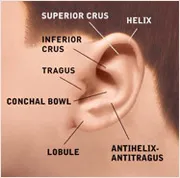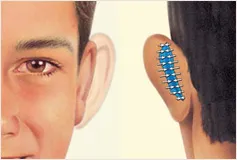Ear Surgery or Otoplasty in Birmingham AL
Improve Balance and Proportion of the Ears and Face
Ear Surgery, also known as otoplasty, can improve the shape, position or proportion of the ear. Ear surgery can correct a defect in the ear structure that is present at birth or that becomes apparent with development. Otoplasty can also treat misshapen ears caused by injury.
Ear surgery creates a more natural shape while bringing balance and proportion to the ears and face. Correction of even minor deformities can have profound benefits to appearance and self-esteem. You may consider this plastic surgery procedure if protruding or disfigured ears are bothering you or your child.
Ear surgery can treat:
- Overly large ears, a condition called macrotia.
- Protruding ears occurring on one or both sides in varying degrees (not associated with hearing loss).
- Adult dissatisfaction with previous ear surgery.
Ear reshaping surgery is designed to provide more attractive framing of the face for children and adults. If you are unhappy with the appearance of your ears, contact us today to get started with your ear surgery consultation.
Ear Surgery Candidates
Children who are good candidates for ear surgery are:
- Healthy and without a life-threatening illness or untreated chronic ear infections.
- Generally 5 years old, or when a child's ear cartilage is stable enough for correction.
- Cooperative and follow instructions well.
- Able to communicate their feelings and do not voice objections when surgery is discussed.
Teenagers and adults who are good candidates for ear surgery are:
- Nonsmokers who are healthy and do not have a life-threatening illness or medical conditions that can impair healing.
- People with a positive outlook and specific goals in mind for ear surgery.
Your Ear Surgery Consultation
The success and safety of your procedure depends very much on your complete candidness during your consultation. You'll be asked a number of questions about your health, desires and lifestyle.
During your ear surgery consultation be prepared to discuss:
- Why you want the procedure, your expectations and desired outcome.
- Medical conditions, drug allergies and medical treatments.
- Use of current medications, vitamins, herbal supplements, alcohol, tobacco and drugs.
- Previous surgeries.
Your plastic surgeon will also:
- Evaluate your general health status and any pre-existing health conditions or risk factors.
- Take photographs for your medical records.
- Discuss your options and recommend a course of treatment.
- Discuss likely outcomes of ear surgery and any risks or potential complications.
- Answer any questions you have about ear surgery.
Ear Surgery Risks and Safety
Possible ear surgery risks include:
- Allergies to tape, suture materials, glues, blood products, topical preparations or injected agents.
- Anesthesia risks.
- Asymmetry.
- Bleeding (hematoma).
- Blood clots.
- Change in skin sensation.
- Infection.
- Pain, which may persist.
- Poor wound healing.
- Possibility of revisional surgery.
- Skin contour irregularities.
- Skin discoloration/swelling.
- Unfavorable scarring.
Ear surgery risks will be fully discussed prior to your consent. It's important that you address all of your concerns about risks with your plastic surgeon. You will be asked to sign consent forms to ensure that you fully understand the procedure you will undergo, the alternatives and the most likely risks and potential complications.
Preparing for Ear Surgery
In preparing for ear surgery, you may be asked to:
- Obtain lab testing or a medical evaluation.
- Take certain medications or adjust your current medications.
- Stop smoking well in advance of surgery.
- Avoid taking aspirin and certain anti-inflammatory drugs and herbal supplements, which can increase bleeding.
Special instructions you receive will cover:
- What to do on the day of surgery.
- The use of anesthesia during your procedure.
- Post-operative care and follow-up.
Ear surgery procedures are performed at our accredited Outpatient Surgery Facility in Birmingham, Alabama. Be sure to arrange for someone to drive you to and from surgery and stay with you for at least the first night after surgery.
Ear Surgery Procedure
Correction of protruding ears uses surgical techniques to create or increase the antihelical fold (just inside the rim of the ear) and to reduce enlarged conchal cartilage (the largest and deepest concavity of the external ear).
Ear surgery is performed using local, intravenous sedation or general anesthesia. Your surgeon will recommend the best choice for you.
Ear Surgery Incisions
Incisions for otoplasty are generally made on the back surface of the ear. When incisions are necessary on the front of the ear, they are made within its folds to hide them. Internal, non-removable sutures are used to create and secure the newly-shaped cartilage in place.
The incision is closed with external stitches. Techniques are individualized, taking care not to distort other structures and to avoid an unnatural "pinned back" appearance.


Ear Surgery Recovery
Discomfort immediately following ear surgery is normal and can be controlled with pain medication. There may be an itchy feeling under bandages. It is essential that bandages remain intact and are not removed for any reason. Failure to do so may result in loss of some of the correction and may require a secondary surgery.
After surgery, bandages or dressings will be applied to keep your surgical site clean, protect it from trauma and to support the new position of the ear during initial healing.
Your plastic surgeon will give you specific instructions on how to care for yourself after surgery. Following these instructions is essential to the success of your ear surgery. The instructions may include:
- How to take care of your ears following surgery.
- Medications to apply or take orally to aid healing and reduce the risk of infection.
- When to follow-up with your plastic surgeon.
Should any complications occur, notify your plastic surgeon who will determine if any additional treatment is needed.
It is important that the surgical incisions are not subjected to excessive force, sunlight or tanning bed light, abrasion or motion during the time of healing.
Ear Surgery Results

Ear surgery offers almost immediate results in cases of protruding ears. Results are visible when the dressings that support the new shape of the ear during initial phases of healing are removed.
With the ear permanently positioned closer to the head, surgical scars are either hidden behind the ear or well hidden within the natural creases of the ear.
Although good results are expected, there is no guarantee of complete satisfaction with the results. In some situations, it may not be possible to achieve optimal results with a single surgical procedure and another surgery may be necessary.
The results of more extensive ear surgery and reconstruction may appear in stages over time.
Ear Surgery Words to Know
- Antihelical fold: A fold that is just inside the rim of the ear.
- Conchal cartilage: The largest and deepest concavity of the external ear.
- Constricted ear: Also called a lop or cup ear, has varying degrees of protrusion, reduced ear circumference, folding or flattening of the upper helical rim and lowered ear position.
- Cryptotia: Also called hidden ear, occurs when the upper rim of the ear is buried beneath a fold of scalp secondary to abnormal folding of the upper ear cartilage toward the head. The folding is the reverse of that commonly seen in the protruding ear.
- Ear axis: The main line of ear growth.
- General anesthesia: Drugs and/or gases used during an operation to relieve pain and alter consciousness.
- Intravenous sedation: Sedatives administered by injection into a vein to help you relax.
- Macrotia: Overly large ears (a rare condition).
- Microtia: The most complex congenital ear deformity when the outer ear appears as either a sausage-shaped structure resembling little more than the earlobe, or has more recognizable parts of the concha and tragus or other normal ear features. It may or may not be missing the external auditory or hearing canal. Hearing is impaired to varying degrees.
- Otoplasty: A surgical procedure also known as ear surgery to improve the shape, position or proportion of the ear.
- Stahl's ear: An ear that is distorted in shape due to an abnormal fold of cartilage.
Procedure Information © American Society of Plastic Surgeons

Ear Surgery, or otoplasty, improves the shape, position or proportions of the ears to bring better balance to the facial features of children and adults.
Birmingham, AL Office & Surgery Suites
Hedden & Gunn Plastic Surgery140 Village Street
Birmingham, AL 35242
205-980-1744 or 800-HeddenMD
 *
*  *
* 
Contact Us Today
Questions About Facial Rejuvenation?
Contact our Alabama cosmetic surgeons today to find out more about Ear Surgery or Otoplasty at Hedden & Gunn Plastic Surgery in Birmingham.
To schedule your consultation at the earliest possible date, please call 205-980-1744.
required fields are marked with an asterisk *
